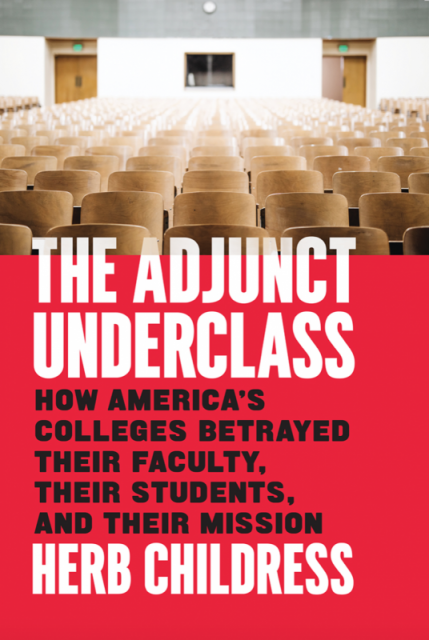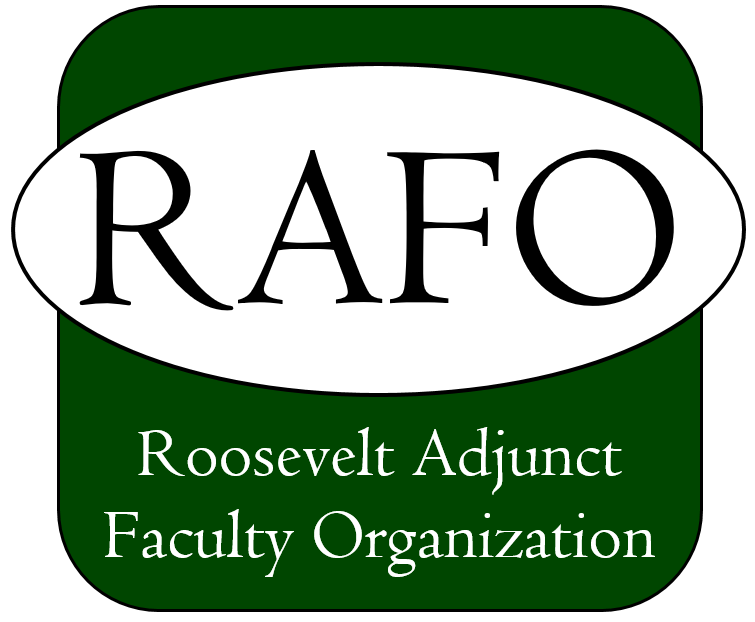There is a position open at Roosevelt for a Visiting Assistant Professor of Biology. If you fit the requirements, we encourage you to apply for this position.
Here is the link: Visiting Assistant Professor of Biology.
This book is timely and interesting--Read the full article here.
‘The Adjunct Underclass’
Herb Childress's new book is a painful, necessary read for anyone looking to understand or empathize with the costs -- human and otherwise -- of higher ed's gig economy.
By Colleen Flaherty
April 16, 2019
The human costs of academe’s festering adjunct problem tend to get lost against the scale of it. We know that the contracting higher education job market entails suffering. But what can be done when, by some estimates, 70 percent of professors are part-time? Every once in a while, though, a human take on the adjunct  issue cuts through the collective too-big-to-fix mentality. The Atlantic’s recent piece on the late historian Thea Hunter, “The Death of an Adjunct,” is one such take. Herb Childress’s new book, The Adjunct Underclass: How America’s Colleges Betrayed Their Faculty, Their Students and Their Mission (University of Chicago Press), is another.
issue cuts through the collective too-big-to-fix mentality. The Atlantic’s recent piece on the late historian Thea Hunter, “The Death of an Adjunct,” is one such take. Herb Childress’s new book, The Adjunct Underclass: How America’s Colleges Betrayed Their Faculty, Their Students and Their Mission (University of Chicago Press), is another.
Through interviews with adjuncts and his own story of working off the tenure track, Childress describes what happens not just to academics’ careers and teaching bandwidth but to their souls when they become workers in the academic pin factory. It’s not pretty. Among other analogies, Childress compares the dynamic to an abusive relationship, where dysfunction becomes the norm but the damage builds too often to breaking.
Still, it would be a mistake to describe Childress’s book as about human costs only. Part memoir, part manifesto, it’s also a rigorous, data-driven analysis of how we got here, why adjunctification hurts the academic enterprise and possible solutions. There’s a full appendix of charts, facts and figures. The mix makes for a book that anyone, novice to expert, can read.
Childress, who also wrote 2016’s The PhDictionary: A Glossary of Things You Don’t Know (but Should) About Doctoral and Faculty Life, recently participated in a Q&A with Inside Higher Ed. Read the full article here.
RAFO is excited to announce the Spring 2019 Mini-Grants awarded to the following adjunct faculty members:
- Beverly Stewart was awarded a grant to complete Blended Learning Design & Instruction coursework to update teaching skills and bring the power of the Internet and Technology into the classroom;
- Elizabeth Boone received funding to attend the Online Teaching Academy Professional Development on campus at Roosevelt University;
- Carla Jones received a grant to complete a certificate in Energy Innovation and Emerging Technologies from the Stanford Center for Professional Development at Stanford University to enhance her teaching of Energy and Climate Change;
- Virginia McHugh-Kurtz was awarded a grant to attend the Sencer Summer Institute to gain skills and learn best practices to profoundly impact students in STEM and increase their awareness on topics, locally and globally; and
- Michael Tafel was awarded funding to continue work on a documentary film about Democracies and Republics with a special emphasis on why they fail.
The RAFO professional development committee encourages adjunct faculty to apply for mini-grants to continue their professional growth activities. We seek unique projects and coursework from full members to increase their skills and ensure their classroom experiences contain the cutting edge methods in pedagogy.
The RAFO professional development committee,
Ami Hicks, Eric Bremmer, and Susan Cooper
RAFO Executive Committee offers sincere thanks to all of the presenters, discussion leaders, and attendees who made our first annual Adjunct to Adjunct Professional Development Conference a successful attempt to share best practices. Presentations varied from “Life Coaching in the Classrooms” by Elizabeth-Anne Stewart to “Adjuncting is Changing! Are You Ready?” by Jacqueline Trussell. Additional conference topics included incorporating Zoom video techniques into the classroom, experiential learning, examining the core pedagogies, and incorporating mock trials in the classroom to improve analytical skills.
Both presenters and attendees offered positive suggestions and commentary for improving the conference structure, future sessions, and encouraging members to attend the professional development offered by the RAFO union. Attendees enjoyed plenty of face time with the Executive Committee, discussions on the enrollment numbers and updates of the state of university. Beverly Stewart of IEA Higher Education finalized our conference with a summary of the possibility of Illinois higher education adjuncts receiving unemployment benefits during the summer term and the current political hurdles of making this a law. The Q&A session that followed reiterated the important of adjunct faculty improving their professional development and making themselves marketable in a challenging job climate.
Continue to follow RAFO on our website at www.rafo.org and on Facebook and Twitter. For future professional development opportunities, we plan to offer reimbursements for the IEA One Conference, the Writing on the Edge Conference at College of DuPage, and opportunities to apply for a RAFO mini grants in Spring 2020. We strive to improve the professional development of the Roosevelt University adjunct faculty.
In solidarity,
RAFO Executive Committee
The Illinois Education Association is seeking proposals from presenters for the 2019 One Conference on October 4-5, at the DoubleTree Hotel, in Oak Brook, Illinois. The focus of the Conference will be on Advocacy, Leadership and Professional Development. Only fully completed proposals will be accepted. The deadline for proposals is June 7, 2019. Trainers for the sessions selected will be notified by e-mail.
RAFO would like to see more involvement from higher education and encourages members to present!
Click here to submit your proposal to the IEA 2019 One Conference.
Subcategories
Contracts
RAFO Members:
As lead negotiator for the 2020-2024 contract, I am pleased to announce that your negotiating team and Roosevelt University have come to an agreement. RAFO is extremely pleased with the final outcome and we believe you will be, too. The University was adamant on 0% for the first year, but as an offset for that 0%, we negotiated a signing bonus of $150 for each bargaining unit member that taught either in Spring 2020 or will teach in the upcoming Fall 2020 semester. That then takes us into the final three years of the contract where adjuncts will receive a 2% increase for each of those years.
As I hope you can see from the above, RAFO worked hard to ensure that you are rewarded for the professionalism and integrity all have shown during these unusual and trying times. We are attaching a copy of the final contract for you to review and eventually ratify. The areas that appear in green are changes that were made to the verbiage in the contract that will support RAFO during the upcoming 4 years. Appendix A reflects the 2% increase for each step in the final three years.
A link with the time will be sent next week for all to join this a zoom meeting, where we can answer your questions about the contract.
In closing, we hope you will be as excited as we are regarding the new contract.
In solidarity,
Don Wlodarski and the RAFO team:
Jen Wilson, Joseph Fedorko, Amelia Hicks, Stan Traywick, Mike Pinsoff and Dennis Tucker
Page 19 of 32

